| 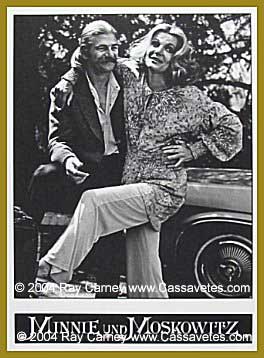 ....I
remember hearing Cassavetes joke about the response to his films. Imitating
an imaginary viewer, he slouched down in his chair and flailed his arms
in front of his face, as if defending himself from the fury of an atomic
blast, all the while chortling: "Oh, no. A new experience. Save me.
Anything but that!" ....I
remember hearing Cassavetes joke about the response to his films. Imitating
an imaginary viewer, he slouched down in his chair and flailed his arms
in front of his face, as if defending himself from the fury of an atomic
blast, all the while chortling: "Oh, no. A new experience. Save me.
Anything but that!"
Films come in cans. Unfortunately,
most of the experiences in them are canned as well. "Look here.
Think this. Feel that." We laugh and cry on cue. It's button-pushing – nothing
like real experience.
Cassavetes gives us something
closer to the turbulence and turbidness of life. He asks us to turn off
the emotional Cruise Control and go off-road. The journey is bumpy and
unpredictable. Characters get in our faces (and under our skin). They
are as hard to figure out (and as changeable) as people outside the movies.
There's no orchestration to tell us what to feel. There's no narrative
road map to show us where we are going. It makes for a pretty rugged trip
at times.
Cassavetes isn't merely being
perverse. He wants to get us lost so that maybe, just maybe, we can
find
ourselves and meet the world in a new way. He wants to force us to throw
away all of our formulas, clichés, and customary patterns of response
in order to encounter life freshly. Disrupting our expectations, dislodging
our stereotypes, making things hard on us is one way to do that.
Love is another way. No filmmaker
had more faith in the power of emotion to show his characters and viewers
the way out of the traps their minds get them into. Love is the great
teacher because it forces us to open our hearts to new experiences. It
forces us to jettison our old ways of understanding.
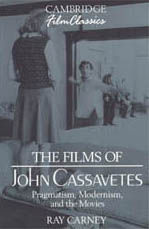 But
don't look for swoony, moony "I-look-into-your-eyes; you-look-into-mine"
Hollywood romance in these films. That is just one more cliché
they shred. The films in this series tell the truth about love in all
of its glorious, painful, wondrous complexity. The truth about how vulnerable
it can make us. How scary it can be. How ferocious it can be at some times
and how delicate at others. The truth about how hard love is to hold on
to, and how fleeting it can be. But
don't look for swoony, moony "I-look-into-your-eyes; you-look-into-mine"
Hollywood romance in these films. That is just one more cliché
they shred. The films in this series tell the truth about love in all
of its glorious, painful, wondrous complexity. The truth about how vulnerable
it can make us. How scary it can be. How ferocious it can be at some times
and how delicate at others. The truth about how hard love is to hold on
to, and how fleeting it can be.
For Cassavetes, filmmaking
was question-asking. His films ask the hardest possible questions
about
the meaning of our lives and relationships – questions we might
not want to know the answers to. They force us to come face to face
with difficult
truths. But what is inspiring is that even after plunging into the darkest
corners of our hearts, the most tortured and twisted recesses of our
souls,
the films never despair or turn cynical. Cassavetes never abandons his
faith in the healing, redeeming power of love.....
* * *
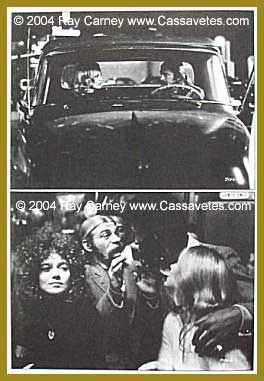 Has a comedy ever taken a viewer
on a wilder emotional roller-coaster ride? On the Cassavetes Comet,
we may chuckle as we chug up the romantic peaks, but are suddenly gasping
for breath when the intellectual ground drops out from under us, or emotionally
whiplashed as we scream around unexpected tonal curves. It's simply impossible
to sit back and get comfortable. We laugh at a joke, then get slapped
in the face by a character named Jim. Out on a blind date with Minnie
and Zelmo, we start giggling, then want to climb under our seats in embarrassment.
The tickle and the pain, the grin and the grimace are right on top of
each other. Has a comedy ever taken a viewer
on a wilder emotional roller-coaster ride? On the Cassavetes Comet,
we may chuckle as we chug up the romantic peaks, but are suddenly gasping
for breath when the intellectual ground drops out from under us, or emotionally
whiplashed as we scream around unexpected tonal curves. It's simply impossible
to sit back and get comfortable. We laugh at a joke, then get slapped
in the face by a character named Jim. Out on a blind date with Minnie
and Zelmo, we start giggling, then want to climb under our seats in embarrassment.
The tickle and the pain, the grin and the grimace are right on top of
each other.
Each time we start to kick
back, Minnie and Moskowitz kicks us back – gunning the
accelerator with dizzying elisions and jump-cuts; screeching on the
brakes to allow
a minor character a crazy solo riff; wildly swerving from toughness to
tenderness. No event unfolds in a straight line. The shortest distance
between any two points is a U-turn.
Every time a tone is about
to build, Cassavetes upsets it. Every time a relationship is about to
stabilize, he pulls the rug out from under it. In this emotional demolition
derby, it's impossible to recline into the featherbed of a simple, sustained
feeling. Like the jazz on the soundtrack, the pacings in Minnie and
Moskowitz are thrillingly irregular and unpredictably syncopated.
We can't get our tonal bearings. We don't know whether we're supposed
to laugh or cry most of the time.
Cassavetes won't let a viewer
expand within a romantic moment. No scene, interaction, or shot gives
us a simple emotion. If a scene has romance in it, it is invariably
crossed with anxiety or pain. If there is seriousness, it is mixed-up
with wacky comedy. If one character is feeling one thing, another is
feeling something different. Even the lovely meditative interlude in
which
Minnie talks to Florence about her dreams and desires makes clear that
Florence doesn't understand a word she is saying. While Minnie is waxing
poetic, Florence is sitting there bewildered and half-soused. Every
perspective
is tangled up with contradictory ones. No imaginative relationship – of
character to character or viewer to character – is uncompromised
or unchallenged.
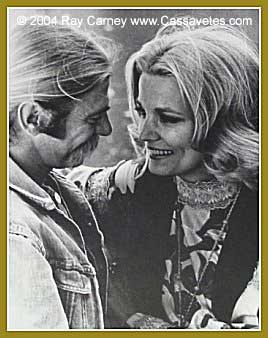 No
filmmaker had a greater distrust of formulas for living or was more
committed to avoiding formulaic
characters and relationships. Cassavetes puckishly trampolines against
all of the ways Hollywood has taught us to think and feel. He turns
every
screwball formula upside-down and inside-out. Leading men are supposed
to be handsome, charming, and aloof; Seymour Moskowitz is a homely,
hot-blooded
carhop who tries to sleep with every woman he meets (succeeding with
two others beyond Minnie in the course of the film – though
one of his early sexual conquests, a night spent with Irish, the girl
in the bar, was cut
by the studio at the last minute). Leading ladies should be mysterious,
unattached, and virginal; Minnie Moore is in a relationship about
as far
from Irene Dunn and Cary Grant as can be imagined. No
filmmaker had a greater distrust of formulas for living or was more
committed to avoiding formulaic
characters and relationships. Cassavetes puckishly trampolines against
all of the ways Hollywood has taught us to think and feel. He turns
every
screwball formula upside-down and inside-out. Leading men are supposed
to be handsome, charming, and aloof; Seymour Moskowitz is a homely,
hot-blooded
carhop who tries to sleep with every woman he meets (succeeding with
two others beyond Minnie in the course of the film – though
one of his early sexual conquests, a night spent with Irish, the girl
in the bar, was cut
by the studio at the last minute). Leading ladies should be mysterious,
unattached, and virginal; Minnie Moore is in a relationship about
as far
from Irene Dunn and Cary Grant as can be imagined.
Even minor characters won't
be reduced to clichès. They are too human, too mixed-up, too complex,
too close to being us. There are no heroes or villains in Cassavetes'
universe. Zelmo (played by Cassavetes regular Val Avery) may be the blind
date from hell, but we can't demonize him. We can't even really hate him.
Cassavetes makes sure that we feel his neediness, his desperation, his
pain. Eternally damned to his own self-created hell, he clearly suffers
for his sins, torturing himself even more than he tortures Minnie, pushing
her away in the very attempt to get close to her. We are forced into sympathy
against our wills. Listen to the sobbing Cassavetes subtly lays in on
the soundtrack at the end of the fight scene.
The secret of Cassavetes' art
is that it is fundamentally an act of empathy. We are not asked to stand
outside and judge (as in an Altman film), but to go inside and understand.
We can't hold ourselves above the characters, untouched by them, superior
to them. Cassavetes opens trap doors into their consciousnesses, so that
they are given the chance to explain themselves and justify their actions.
We are forced to see things from their perspectives, feeling what
they feel. No one is generic, a type; everyone is a unique individual.
Morgan Morgan (played by Tim Carey), odd duck that he is, touches us with
his bonhomie and lame attempts at humor. Florence's sad loneliness and
confession of sexual frustration move her beyond being simply comical.
We can't merely laugh at any of Cassavetes' characters; we are forced
to care.
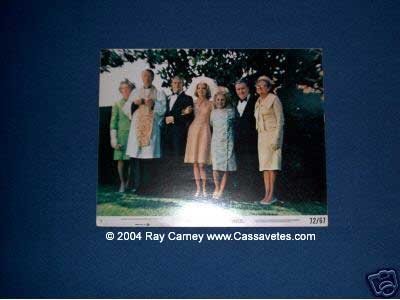 Cassavetes'
films are not ultimately about actions and events, but feelings. They
are not about what characters
do, but what they are and can be. The central dramatic
issue faced by the figures in Minnie and Moskowitz is that they
are each imprisoned in doomed ways of being – trapped by limiting
emotions, memories, and experiences. The masterplot of all of Cassavetes'
work is
the question of whether – emotionally wounded and beset with problems
as they may be – characters can keep alive possibilities of love
and caring. Heaped with pressures as they are, can they find a way to
hold onto their
innocence and vulnerability? Cassavetes'
films are not ultimately about actions and events, but feelings. They
are not about what characters
do, but what they are and can be. The central dramatic
issue faced by the figures in Minnie and Moskowitz is that they
are each imprisoned in doomed ways of being – trapped by limiting
emotions, memories, and experiences. The masterplot of all of Cassavetes'
work is
the question of whether – emotionally wounded and beset with problems
as they may be – characters can keep alive possibilities of love
and caring. Heaped with pressures as they are, can they find a way to
hold onto their
innocence and vulnerability?
The specific focus of Minnie
and Moskowitz is culturally inherited forms of masculinity and
femininity – especially
as handed down to us by Hollywood movies. The film is an echo chamber
of compared and contrasted versions of what it is to be a man or
a woman
in modern America. Minnie (brilliantly played by Gena Rowlands to bring
out her shell-shocked vulnerability as a result of the romantic
battles
she has had to fight) must find a new way of being a woman. She must
get over her fears of being wounded, and learn how to give love
without giving
herself away, how to receive it without losing track of who she is.
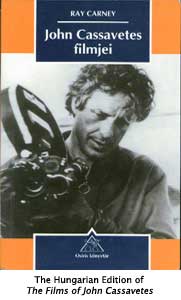 Moskowitz
is Cassavetes' attempt to imagine a new form of manhood that avoids the
pushiness, competitiveness, and emotional guardedness of male culture.
(As Faces, The Killing of a Chinese Bookie, and Love
Streams show, one of Cassavetes' great themes is what it is to be
a man.) Cassavetes plunks Seymour down in a house of mirrors comprised
of alternative, flawed images of manhood – from Humphrey Bogart,
Wallace Beery, and Charles Boyer (Cassavetes had wanted to include a clip
from Algiers), to Zelmo, Morgan, Jim, and Dick Henderson. Cassavetes
has Moskowitz's scenes, gestures, and lines of dialogue subtly echo Zelmo's
and Jim's, to bring out both the differences and the similarities. As
Seymour Cassel wonderfully plays the character, Moskowitz represents a
rejection of male intellectualism, coolness, and distance in favor of
utterly uncool emotional expressiveness. (Moskowitz is in many respects
a spiritual self-portrait of the artist who created him.) He is Cassavetes'
Boudu – in fact, more interesting and complex than Renoir's figure,
because he is less abstracted and idealized. Moskowitz
is Cassavetes' attempt to imagine a new form of manhood that avoids the
pushiness, competitiveness, and emotional guardedness of male culture.
(As Faces, The Killing of a Chinese Bookie, and Love
Streams show, one of Cassavetes' great themes is what it is to be
a man.) Cassavetes plunks Seymour down in a house of mirrors comprised
of alternative, flawed images of manhood – from Humphrey Bogart,
Wallace Beery, and Charles Boyer (Cassavetes had wanted to include a clip
from Algiers), to Zelmo, Morgan, Jim, and Dick Henderson. Cassavetes
has Moskowitz's scenes, gestures, and lines of dialogue subtly echo Zelmo's
and Jim's, to bring out both the differences and the similarities. As
Seymour Cassel wonderfully plays the character, Moskowitz represents a
rejection of male intellectualism, coolness, and distance in favor of
utterly uncool emotional expressiveness. (Moskowitz is in many respects
a spiritual self-portrait of the artist who created him.) He is Cassavetes'
Boudu – in fact, more interesting and complex than Renoir's figure,
because he is less abstracted and idealized.
Hollywood film is based on
idealizations of every sort, at every level. Cassavetes radically de-idealizes
experience and expression....
This page only
contains excerpts and selected passages from Ray Carney's writing about
John Cassavetes. To obtain the complete text as well as the complete texts
of many pieces about Cassavetes that are not included on the web site,
click
here. |









